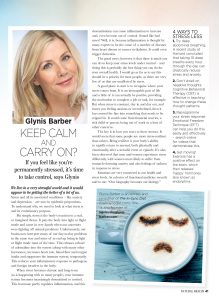We live in a very stressful world and it would appear to be getting the better of a lot of us.
Stress and all its associated conditions – like anxiety and depression – are now in epidemic proportions. To understand why, we need to look at what stress is and its evolutionary purpose.
Put simply, stress is the body’s reaction to a real, or imagined threat
It puts the body into fight or flight mode and came in very handy when our ancestors were fighting off animal predators. Unfortunately, our brains now interpret many of our day-to-day problems in the same way and some of us end up being in fight or flight mode most of the time. This releases a flood of adrenaline into the system (along with many other hormones), increases heart rate, blood flow and oxygen intake and suppresses the immune system, temporarily.
Stress therefore reduces your inflammatory response to pathogens and foreign invaders in the body
When stress becomes chronic and long-term (as is happening with so many people), your immune system becomes increasingly desensitised to cortisol. This hormone partly regulates inflammation, and this desensitisation can cause inflammation to increase and, even become out of control. Sound like bad news? Well, it is, because inflammation is thought by many experts to be the cause of a number of diseases from heart disease to cancer to diabetes. It could even trigger dementia.
The good news is that there is much you can do to keep your stress levels under control
– and doing this is probably the best thing you can do for your overall health. I would go as far as to say this should be a priority for most people, as there are very few of us that are unaffected by stress
A good place to start is to recognise where your stress comes from
It is an inescapable part of life and a little of it can actually be positive, providing the motivation to complete a job or task, for example. But when stress is constant, day in and day out, and leaves you feeling anxious or overwhelmed, then it has crossed the line into something that needs to be reigned in. It could come from financial worries, a sick child or parent, being out of work or a host of other concerns.
The key is in how you react to these stresses
It would seem that some people are more stress-resilient than others. Being resilient is your body’s ability to rapidly return to normal, both physically and emotionally, after a stressful event or episode. It’s also been observed that men and women experience stress differently, with women more likely to suffer from stomach-churning anxiety and also feelings of sadness in response to stress.
Emotions are very connected to our health and stress levels. As a doctor of functional medicine recently said to me: “Our biography becomes our biology.”
4 ways to stress less
- Try deep abdominal breathing. A recent study at Harvard concluded that taking 10 deep breaths every hour through the day can drastically reduce stress and anxiety.
- Don’t dwell on negative thoughts. Cognitive Behavioral Therapy (CBT) is effective in teaching how to change these thought patterns.
- Reprogramme your stress response. Emotional Freedom Technique (EFT) can help you do this easily and effectively – search online for videos that demonstrate this.
- Get moving! Exercise has a positive effect on the brain, which then releases ‘happy’ hormones also known as endorphins.

